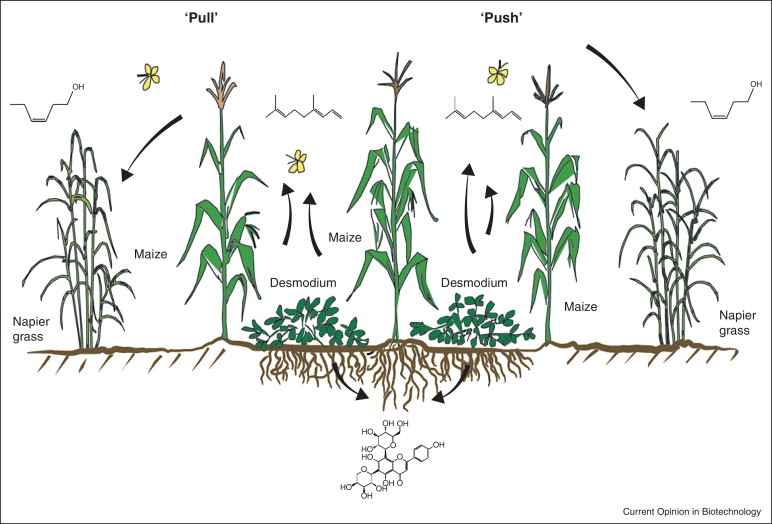Advances in intercropping
You are here

Postgraduate Course
Advances in intercropping: principles and implementation
To be announced
Scope
 Intercropping is the next frontier for diversifying agriculture and increasing its productivity, resource use efficiency and resilience to abiotic and biotic stresses. Given the challenges of biodiversity decline and climate change it might well be that intercropping is one of the solutions to strengthen the resilience of cropping systems to these environmental threats and sustain food security. Nevertheless intercropping is not a common practice in the Western world. The question is why.
Intercropping is the next frontier for diversifying agriculture and increasing its productivity, resource use efficiency and resilience to abiotic and biotic stresses. Given the challenges of biodiversity decline and climate change it might well be that intercropping is one of the solutions to strengthen the resilience of cropping systems to these environmental threats and sustain food security. Nevertheless intercropping is not a common practice in the Western world. The question is why.
This post graduate course focuses on how intercropping promotes productivity, resource use efficiency and resilience of agriculture but is nevertheless not common in the Western world. Experts involved in European projects on cropping system diversification will highlight the state of the art in intercropping research and its implementation in practice.
Set-up
The course starts on Monday morning with a an introduction and a keynote lecture. Subsequently, we will have a participant poster carousel in which participants introduce themselves via a poster.
Each day starts with 2 - 3 lectures (20-30 minutes each), followed by a 30-minute discussion convened by 2 - 3 participants who will challenge the speaker on the presentation and the papers that the speaker submitted a-priori. Each day will focus on a specific topic:
- Monday: Abiotic factors determining yield and resource use efficiency
- Tuesday: Abiotic factors determining yield and resource use efficiency
- Wednesday: Intercropping to manage biotic stress factors
- Thursday: Socio–economic factors and crop management
- Friday: Group work presentations
Afternoons will be spent on working group sessions in which participants are split into groups of 4 - 5 participants. Each group will work on research proposals on crop system diversification.
The proposals will be presented on the last day, an international jury will select the best proposal.
Programme
Monday
Morning: Welcome
Poster carousel
Afternoon: Lectures: Abiotic factors determining yield and resource use efficiency:
- Wopke van der Werf (Wageningen University): Intercropping for sustainable intensification of crop production
- Jochem Evers (Wageningen University): Resource capture in species diverse systems
- Sebastian Munz (University of Hohenheim): Intercropping for more resilient crop production
Working group sessions
Tuesday
Morning: Lectures: Abiotic factors determining yield and resource use efficiency:
- Wopke van der Werf (Wageningen University): Research synthesis for intercropping: methods and metrics
- Liesje Mommer (Wageningen University): Below–ground interactions in intercropping
- Li Long (China Agricultural University): Beneficial plant–plant interactions in intercropping
Afternoon: Working group sessions
Wednesday
Morning: Lectures: Intercropping to manage biotic stress:
- Maria Finck (University of Kassel): Intercropping for disease control
- Lammert Bastiaans (Wageningen University): Weed suppression in intercropping
- Lenora Ditzler/Dirk van Apeldoorn (Wageningen University): Strip cropping for resilient crop production
Afternoon: Working group sessions
Thursday
Morning: Lectures: Socio–economic factors and crop management:
- To be determined: Socio–economic factors driving adoption of intercropping practices
- Tjeerd–Jan Stomph (Wageningen University): The intercropping mechanisation challenge
- Laurent Bedoussac (Ecole Nationale Supérieure de Formation de l'Enseignement Agricole | ENSFEA): The supply chain challenges of intercropping
Afternoon: Working group sessions
Friday
Morning: Student presentations and farewell after lunch
Course Organisers
- Lammert Bastiaans (Wageningen University, Wageningen, the Netherlands)
- Jochem Evers (Wageningen University, Wageningen, the Netherlands)
- Wopke van der Werf (Wageningen University, Wageningen, the Netherlands)
- Claudius van de Vijver (Graduate School PE&RC, Wageningen, the Netherlands)
General information
| Target Group | The course is aimed at PhD candidates and other academics |
| Group Size | Min. 20 / Max. 30 participants |
| Course duration | 5 days |
| Language of instruction | English |
| Number of credits | 1.5 ECTS |
| Prior knowledge | Participants must have insight in agronomic processes at PhD level |
| Location | To be announced |
Fees 1
Generally, the following fees apply for this course, but note that the actual fees may be somewhat different for the next edition of this course.
| EARLY-BIRD FEE 2 | REGULAR FEE 2 | |
| PE&RC / WIMEK / WASS / EPS / VLAG / WIAS PhDs with TSP | € 350,- | € 400,- |
| a) All other PhD candidates b) Postdocs and staff of the above-mentioned Graduate Schools and ReMIX |
€ 800,- | € 850,- |
| All others | € 1.150,- | € 1.200,- |
1 The course fee includes accommodation, all meals, course materials, coffee/tea, and water. It does not include beverages in the bar
2 The Early-Bird Fee generally applies to anyone who REGISTERS AT LEAST 4 WEEKS PRIOR TO THE START OF THE COURSE
Note:
- The Early-Bird policy is such that the moment of REGISTRATION (and not payment) is leading for determining the fee that applies to you.
More information
Dr. Claudius van de Vijver (PE&RC)
Phone: +31 (0) 317 485116
Email: claudius.vandevijver@wur.nl
Registration
At this moment, this course is not scheduled yet. However, if you register your interest in this activity below, we will inform you as soon as the course is scheduled and registration of participation is opened.
